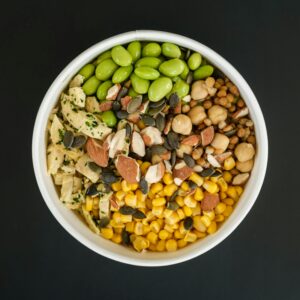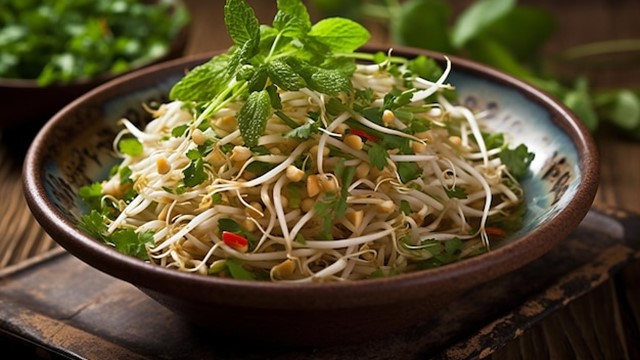Sprouts are young, germinating seeds that have just started to grow. These tiny powerhouses are packed with essential nutrients and enzymes, showcasing remarkable health benefits from a variety of seeds, beans, grains, or nuts.

Culinary Significance:
The culinary significance of sprouts extends beyond their small size, portraying a powerful impact on dishes, both in terms of nutrition and taste. Here’s an exploration of their culinary importance:
Nutrient Concentration:
Nutritional Powerhouses:
Vitamin and Mineral Density:
Sprouts, in their early growth phase, contain intensified levels of vitamins (A, C, K, B vitamins) and minerals (iron, calcium, potassium) compared to mature plants.
Enzyme-Rich Foods:
Enhanced Enzymatic Activity:
Sprouts are known for their increased enzymatic activity, aiding in digestion and potentially enhancing nutrient absorption in the body.
Versatility in Cooking:
Fresh and Crunchy Texture:
- Textural Element: Sprouts offer a satisfying crunch and a delicate texture, providing contrast in salads, wraps, and sandwiches.
Culinary Adaptability:
- Flexible Ingredient: They integrate seamlessly into various cuisines and dishes, complementing flavors and adding a burst of freshness.
Culinary Exploration:
Flavor Enhancement:
- Mild and Nutty Notes: Sprouts contribute a subtle, mild flavor profile, allowing them to harmonize with diverse ingredients without overpowering other elements.
Innovative Recipes:
- Creative Applications: Chefs and home cooks experiment by incorporating sprouts into soups, stir-fries, smoothies, and even as toppings for pizzas or burgers.
Nutritional Enrichment:
Health-Promoting Elements:
- Enhanced Nutritional Content: Sprouts’ intensified nutrient profile offers health-promoting benefits, supporting overall well-being and a balanced diet.
Dietary Inclusion:
- Nutrient-Dense Addition: Inclusion of sprouts in meals allows for a natural boost in essential nutrients, contributing to a more nutritionally complete diet.
Freshness and Sustainability:
Home Cultivation:
- Accessible Home Gardening: Growing sprouts at home provides a sustainable way to access fresh, nutrient-rich produce year-round, promoting self-sufficiency.
Reduction of Food Waste:
- Efficient Utilization: Sprouts offer a means to utilize seeds, grains, or legumes efficiently, minimizing food waste by utilizing their initial stages of growth.
Culinary Ingenuity:
Visual Appeal:
- Aesthetically Pleasing: Sprouts lend a visually appealing element to dishes, elevating presentation with their vibrant colors and delicate appearance.
Culinary Diversity:
- Expanding Culinary Horizons: Embracing sprouts encourages culinary diversity, inviting individuals to explore new flavors and textures in their meals.
Sprouts, with their potent nutritional content and adaptability in various culinary preparations, stand as a symbol of culinary innovation and wellness. Their small yet significant presence in dishes underscores their importance in enhancing both the nutritional and sensory aspects of food, promoting healthier and more diverse eating experiences.
Health Benefits
Sprouts offer a myriad of health benefits due to their rich nutritional content and active compounds in the early stages of growth. Here are the key health benefits associated with consuming sprouts:
Enhanced Nutritional Profile:
Increased Vitamin and Mineral Content:
- Nutrient Density: Sprouts contain intensified levels of vitamins (A, C, K, B vitamins) and minerals (iron, calcium, potassium) compared to their mature counterparts.
Antioxidant Properties:
- Rich in Antioxidants: Abundant in antioxidants like vitamin C and flavonoids, aiding in combating free radicals, reducing oxidative stress, and supporting overall health.
Digestive Health:
Enzyme Activity:
- Improved Digestion: Sprouts possess active enzymes that can assist in breaking down proteins, aiding digestion, and potentially improving nutrient absorption.
Dietary Fiber:
- Digestive Support: Sprouts, especially those from legumes or seeds, offer dietary fiber, promoting digestive regularity and supporting gut health.
Immune System Support:
Vitamin C Content:
- Immune Boost: Sprouts’ high vitamin C content contributes to a robust immune system, aiding in fighting off infections and supporting overall immunity.
Antibacterial Properties:
- Potential Anti-microbial Effects: Some sprouts exhibit antimicrobial properties, potentially aiding in fighting certain bacterial infections.
Heart Health:
Reduced Risk of Cardiovascular Issues:
- Heart-Healthy Nutrients: The presence of potassium, magnesium, and fiber in sprouts may contribute to maintaining healthy blood pressure and cholesterol levels.
Omega-3 Fatty Acids:
- Healthy Fats: Certain sprouts, like flaxseed sprouts, provide omega-3 fatty acids, known for their heart-protective properties.
Weight Management:
Low-Calorie, Nutrient-Dense Food:
- Satiety Factor: Sprouts offer a satisfying crunch and nutrient density, helping to reduce calorie intake while providing essential nutrients, aiding in weight management.
Metabolism Boost:
- B-Vitamins: B-vitamins present in sprouts might support metabolic processes, potentially aiding in weight loss efforts.
Eye and Skin Health:
Vitamin A and Antioxidants:
- Vision and Skin Support: Vitamin A and antioxidants in sprouts promote healthy vision and skin, potentially reducing the risk of age-related eye issues.
Collagen Formation:
- Support for Tissue Repair: Nutrients in sprouts may aid in collagen formation, supporting skin elasticity and wound healing.
Potential Disease Prevention:
Anti-Inflammatory Properties:
- Reduced Inflammation: Compounds in sprouts exhibit anti-inflammatory properties, potentially reducing the risk of chronic diseases linked to inflammation.
Anticancer Effects:
- Phytochemicals: Some sprouts contain phytochemicals with potential anticancer properties, though further research is ongoing in this area.
Consuming sprouts as part of a balanced diet can contribute to overall health and well-being, offering a nutrient-dense addition that may aid in various aspects of health, from digestion and immunity to heart health and disease prevention.
Types of Sprouts:
Here are some common types of sprouts categorized based on the seeds, beans, or grains used in their cultivation:

Seed Sprouts:
- Alfalfa Sprouts:
- Mild and nutty flavor with a crispy texture. These sprouts are rich in vitamins (particularly vitamin K), minerals, and antioxidants.
- Broccoli Sprouts:
- Young broccoli plants with a peppery taste and rich in sulforaphane, a potent antioxidant associated with numerous health benefits.
- Radish Sprouts:
- These sprouts have a spicy and peppery flavor, adding a zesty kick to dishes. They are a good source of vitamins and minerals.

Bean Sprouts:
- Mung Bean Sprouts:
- Crisp and slightly sweet with a fresh taste, commonly used in Asian cuisines like stir-fries, salads, and soups due to their crunchy texture.
- Soybean Sprouts:
- Nutty and crunchy sprouts used in Korean cuisine, providing a distinct flavor to dishes like bibimbap, soups, and stews.
- Chickpea Sprouts:
- These sprouts offer a nutty and slightly sweet taste, packed with nutrients and commonly used in salads, sandwiches, and wraps.
Grain Sprouts:
- Wheatgrass:
- Wheatgrass sprouts are young shoots of the wheat plant, often juiced for their nutrient content, including vitamins, minerals, and chlorophyll.
- Quinoa Sprouts:
- Mild and slightly nutty flavor with a crunchy texture. Quinoa sprouts are high in protein, vitamins, and minerals.
- Barley Sprouts:
- Barley sprouts have a mild taste and offer a nutty flavor profile. They contain vitamins, minerals, and dietary fiber.
Lentil and Legume Sprouts:
- Lentil Sprouts:
- These sprouts have a slightly peppery flavor and are rich in protein, fiber, vitamins, and minerals.
- Pea Sprouts:
- Tender and sweet with a mild pea flavor. Pea sprouts are packed with nutrients like vitamin C, vitamin A, and antioxidants.
- Kidney Bean Sprouts:
- These sprouts offer a unique texture and taste and are rich in nutrients like iron, potassium, and folate.
Each type of sprout varies in flavor, texture, and nutritional composition, offering a diverse range of culinary possibilities and health benefits when incorporated into various dishes, salads, sandwiches, wraps, and stir-fries.
Dishes made by sprouts
Sprouts can be used in a wide array of dishes, adding a nutritious and crunchy element to various cuisines. Here are some popular dishes made using sprouts:
Salads and Bowls:
- Sprout Salad:
- A simple mix of different sprouts like mung beans, alfalfa, and broccoli sprouts tossed with chopped vegetables, herbs, and a light vinaigrette.
- Quinoa and Sprout Salad:
- A blend of cooked quinoa, assorted sprouts, cherry tomatoes, cucumber, avocado, and a tangy lemon dressing.
- Thai Sprout Salad:
- A vibrant salad featuring mung bean sprouts, shredded carrots, cabbage, peanuts, and a zesty Thai-inspired dressing.
Stir-Fries and Asian Dishes:
- Stir-Fried Sprouts:
- Quickly sautéed mung bean or soybean sprouts with vegetables, tofu, or meat, seasoned with soy sauce, garlic, and ginger.
- Pad Thai with Bean Sprouts:
- Classic Thai noodle dish incorporating bean sprouts, rice noodles, tofu, shrimp, or chicken, flavored with tamarind sauce and peanuts.
Sandwiches and Wraps:
- Sprout and Avocado Sandwich:
- Whole-grain bread layered with avocado, alfalfa or radish sprouts, tomato slices, and a hint of lemon or mayo.
- Lentil Sprout Wrap:
- A wrap filled with lentil sprouts, mixed greens, hummus, and sliced veggies like bell peppers, cucumbers, and carrots.
Soups and Broths:
- Sprout and Vegetable Soup:
- A light soup featuring a variety of sprouts with diced vegetables, simmered in a flavorful vegetable broth.
- Miso Soup with Bean Sprouts:
- A Japanese-style miso soup enriched with soybean sprouts, tofu, seaweed, and scallions.
Side Dishes and Appetizers:
- Stuffed Mushroom Caps with Sprouts:
- Mushroom caps filled with a mixture of sprouts, breadcrumbs, herbs, and cheese, baked until golden.
- Sprout Fritters:
- Patties made from a mix of mashed lentils or chickpeas, sprouts, onions, spices, and shallow-fried until crispy.
Rice and Grain-Based Dishes:
- Sprout Fried Rice:
- Cooked rice stir-fried with mixed sprouts, vegetables, scrambled egg, and soy sauce, creating a nutritious and flavorful meal.
- Sprouted Lentil Pilaf:
- A pilaf made by sautéing sprouted lentils with aromatic spices, cooked rice, and assorted nuts or dried fruits.
Pizza and Toppings:
- Sprout and Veggie Pizza:
- Pizza topped with a mix of sprouts, roasted vegetables, cheese, and herbs for a healthier and vibrant option.
- Sprout Bruschetta:
- Grilled bread topped with a mixture of sprouts, diced tomatoes, garlic, olive oil, and balsamic vinegar.
These dishes showcase the versatility of sprouts, allowing them to be integrated into a variety of cuisines, offering texture, flavor, and a nutritional boost to meals.




